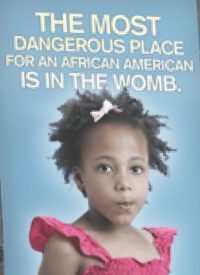
Life Always placed the candid billboard as part of a national campaign for Black History Month. The group defends the message, indicating it highlights Planned Parenthood’s “targeting of minority neighborhoods.”
The billboard’s presence, however, was short-lived, as a number of opponents demanded that it be taken down The Blaze writes:
A spokesman for Louisiana-based Lamar Advertising, Hal Kilshaw, said that while the company respects the right to freedom of expression, the decision to take down the billboard Thursday night was for "public safety." He said waiters and waitresses at a restaurant in the building where the billboard was placed had been harassed.
Predictably, Reverend Al Sharpton had planned to stage a demonstration against the billboard on Friday, prior to learning that it would be removed. He applauded Lamar Advertising’s decision.
Though Sharpton has claimed to be open to debate on abortion in the black community, he added that he was unhappy with the method in which the subject was brought to the public’s attention. “The way you address that is not by demonizing black women,” he contended.
Planned Parenthood claims that the advertisement was a “condescending effort to stigmatize and shame African-American women.”
The pro-life group Life Always “strongly disagrees” with the decision to remove the billboard.
Opposition to the billboard and allegations of racism in its message reveal a fundamental misunderstanding of abortion rates in black community and of the origins of Planned Parenthood.
First, data from the New York City health department reveals that in 2009, 41 percent of pregnancies were terminated, while the rate in the black community was closer to 60 percent. Across the nation, abortion rates are higher within black and other minority communities.
In fact, abortion in the black community is a targeted issue for the African-American group L.E.A.R.N. (Life Education And Resource Network), a national network of Christian pro-life/pro-family advocates who are dedicated to protecting the pre-born and promoting traditional family values. The group, which was established in 1993 at the African American Pro-Life Planning Conference in Houston, Texas, aims to facilitate strong relationships with other minority pro-life/pro-family advocates.
According to the group’s website, abortion has been the leading cause of death in the black community since 1973 (totaling 16 million), outstripping AIDS, violent crimes, accidents, cancer, and heart disease. The site adds that while minority women constitute only 13 percent of the population, they comprise 36 percent of abortions.
“Abortion has swept through the Black community like a scythe, cutting down every fourth member,” the site reads.
In addition to the startling abortion statistics in the black community, it’s also no secret that Planned Parenthood founder Margaret Sanger viewed abortion as a means to eliminate the black population. As a eugenicist, she believed abortion to be an effective method by which to rid the population of those she felt were undesirables, including in her opinion African Americans.
In The Eugenic Value of Birth Control Propaganda, Sanger declared, “Today eugenics is suggested by the most diverse minds as the most adequate and thorough avenue to the solution of racial, political and social problems.”
Sanger’s racism was evident when she claimed that “the weak, the poor and the blacks were little more than weeds who needed to be uprooted and/or sterilized to further the good of mankind.”
Likewise, in the 1930s, she established a sterilization initiative called The Negro Project, to which she referred in a 1939 letter to Dr. Clarence Gamble in which she warned, “We do not want word to go out that we want to exterminate the Negro Population.”
When one considers the effects that Planned Parenthood and abortions have had on the black community, it becomes clear that the pro-life billboard not only effectively proved a factual point, but was a necessary presence in order to raise awareness in the black community and bring to light all that Planned Parenthood has tried to keep in the dark.




